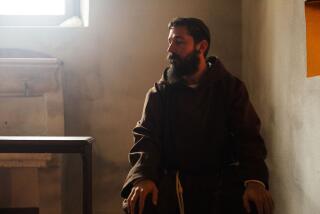RELIGION : 35 Catholic Parishes Join Effort to Make Confirmation Education More Meaningful
- Share via
Eduardo Rivera said he “didn’t learn much” when at age 12 his parents enrolled him in a religious education class to learn about a Roman Catholic sacrament called confirmation.
“All I did was sit in a classroom with 30 other kids and listen to a teacher,” Rivera said. “I was confirmed, but didn’t know what was going on.”
So, when his parish offered a new kind of class about this sacrament two years ago, Rivera decided to give it another try. Now at age 16, he is telling a different story.
“This time I really enjoyed it,” the Venice High School sophomore said. “It made me think about myself and my family and how I should live my life.”
Rivera as well as teen-agers from 34 other churches in the Los Angeles Roman Catholic Archdiocese are the first to participate in a new education process designed to form more committed, faithful Catholics through the Sacrament of Confirmation, the spiritual strengthening of a church member.
The purpose of the new policy is to enrich the meaning of confirmation, which culminates a personal commitment to live according to Catholic Christian values, said Sister Edith Prendergast, director of religious education for the archdiocese. At confirmation, a candidate publicly renews or confirms promises that were made on his behalf at Baptism and thus completes his initiation into the church, she explained.
In the past, confirmation education has been integrated into the daily Catholic school curriculum of most seventh or eighth graders, who would be confirmed in an annual ritual that involves an anointment with holy oil by a bishop. Catholic children, like Rivera, who did not attend parochial schools could be enrolled by their parents in a weekly Sunday-school type of class.
But under a new and significantly different policy initiated by Los Angeles Archbishop Roger M. Mahony, confirmation preparation will soon become a voluntary, after-school or weekend activity for high school aged youths, not 12-year-olds. It will involve two-years of intense religious education sponsored by local parishes, instead of Catholic schools, Prendergast said.
“We want young people to make the decision on their own to become responsible Catholics,” she said. “When students are younger often they are not mature enough to make that kind of decision.”
Peter Mastan, 17, who is about to complete classes at St. John Fisher in Rancho Palos Verdes, said the two-year preparations “have made me feel more like an adult. I said I wanted to be a member of the church. My parents didn’t say it for me.”
Although students and instructors participating in a 35-parish pilot program have generally praised the new approach, some parents who send their children to Catholic school are upset because confirmation preparation will no longer take place in school, several teachers said.
“Some parents who are paying for Catholic education are angry that their kids aren’t going to be automatically confirmed anymore,” said Theresa V. Gutierrez, a teacher at St. Gerard Majella Church in Mar Vista. “Now, their kids are going to have to do this on their own.”
Because the class is voluntary, archdiocese officials expect the numbers of confirmation candidates to drop.
“But we are looking for quality, not quantity,” Prendergast said. “We just don’t want students to go through a ritual. We want serious, committed young people who want to make their faith a priority.”
Under the new guidelines, which will go into effect throughout the archdiocese in September, high school students will re-examine their faith and review the teachings of the Catholic Church in preparation to receive the Sacrament of Confirmation. Instruction will involve group discussions, service projects, retreats and group outings.
Instead of previous religion classes in which a “teacher gives out information and a student repeats it back,” the new process encourages youths to become active members of their church, said Judy Casar, high school confirmation consultant for the archdiocese.
The new classes are centered around the “parish community,” Casar said. For the most part, lay church members will run the classes and “invite” their high-school aged parishioners to participate in the confirmation process, she said.
Casar makes a point of sticking to the word “process” not program when describing the new curriculum, because it more accurately reflects “what we hope will be on ongoing Christian transformation” of the students.
In conferring the Sacrament of Confirmation to high school students, the Los Angeles archdiocese joins a growing number of Catholic dioceses throughout the country that in the past 15 years have been moving toward confirming older Catholics, said Father Joseph Battaglia, communications director for the Los Angeles Archdiocese.
In California, the dioceses that confirm high school students rather than younger students include Orange, San Diego, San Bernardino, Fresno and Stockton.
The decision as to what age to confirm Catholics is made by individual bishops because Church laws are vague, saying that the sacrament is to be conferred “at about the time of the age of discretion,” Battaglia said.
“That would be more than enough reason for a Catholic bishop to decide to move confirmation to a more mature age,” Battaglia said.
Has Greater Understanding
The theological reason behind this is that an older, mature Catholic is able to more fully understand what it means to commit himself to a Christian life style and is a more credible candidate to become confirmed and strengthened in faith, said Father Arthur A. Holquin, director of the office of liturgy and music in the Diocese of Orange.
Another school of thought, however, maintains that full spiritual empowerment should be conferred at an early age so that a person already has the inner strength to grow and mature into a faithful Catholic, Holquin said.
“It’s a little more difficult to understand the second type of thinking, especially for American Catholics,” Holquin said. “We are practical people and the first explanation makes more sense.”
This spring, the 35 Los Angeles area parishes participating in the pilot project are completing the curriculum, with most confirmation ceremonies scheduled in the next two months, Prendergast said. At the same time all parishes have been sending a team of instructors to archdiocese-sponsored training courses, she said.
Linda Garcia, 16, of Mar Vista is one of the first to complete the courses and will be confirmed in a few weeks at St. Gerard Majella Church. She said she enrolled in the class at first because she thought it was expected of her.
“But after a while I realized I was doing something good for myself,” Garcia, a junior at Santa Monica High School, said. “For me, confirmation means getting closer to Jesus and getting to know myself better. And I went through it all because I wanted to, not because my parents forced me.”
More to Read
Sign up for Essential California
The most important California stories and recommendations in your inbox every morning.
You may occasionally receive promotional content from the Los Angeles Times.










